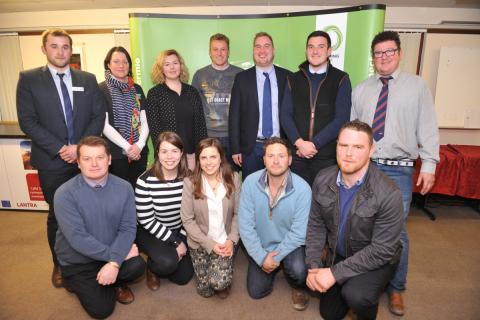A group of future young leaders in Welsh agriculture have launched a video setting out their case for policies that could shape a strong farming industry in Wales post-Brexit.
The video message to policy makers, outlining key priorities, was launched by the Farming Connect Agri-Academy Rural Leadership Programme group at the 2017 Royal Welsh Winter Fair in Llanelwedd.
Covering issues ranging from technology and the Welsh language to the economics and promotion of farming, the 12 Programme members set out their vision for a resilient and vibrant future for Welsh agriculture.
A panel of industry experts were on hand to discuss their outlook in a question and answer-style session at the Winter Fair, asking the Programme members how they would deliver on some of their suggestions.
Alan Davies, managing director of the Farmers’ Union of Wales, Rebecca Williams, Wales director of the Country Landowners Association Cymru, and Gareth Wilson, head of Future Farming Policy at the Welsh Government, were joined on the panel by Kevin Roberts, chair of Hybu Cig Cymru, and John Mercer, director of NFU Cymru.
Questioned on their solutions for safeguarding Welsh agriculture post-Brexit, their strategies centered on initiatives to make the industry more attractive to young people.
Many believed there was a strong case for apprenticeship schemes in agriculture.
James Evans, of Nant Gwynant, Gwynedd, said such schemes bring people into the industry. “It is very important that the industry doesn’t stagnate and that we have the next generation coming through.’’
Farmer’s daughter Awel Mai, a solicitor working for a specialist rural law firm in Welshpool, urged the government to consider providing emergency financial support to farming businesses hit hardest by Brexit trade issues outside their control.
That funding, which would have a qualifying threshold, could be in place for three years, she suggested.
“Farmers, clients and neighbours are all worried about what is going to happen in two years’ time. Financial security is up there with trade in terms of concerns.’’
Dafydd Jones, who is also vice-chair of Wales YFC, urged the Welsh Government to tackle disparities in the provision of a good communications network.
“Technology is playing a big role in the loss of the rural workforce. I have no telephone signal at home - I have no Gs let alone 5G - and it is very restrictive.’’
The session was chaired by Professor Wynne Jones OBE FRAgS, chair of the Farming Connect strategic advisory board.
Professor Jones said the session had shown that the best investment of any funds was in developing people. “We are reaping the benefits of the Agri Academy programme,’’ he said.
The Rural Leadership Programme offers an intense package of residential sessions, seminars, workshops and study visits including a visit to Brussels, to inspire and develop the next generation of leaders within rural Wales. Securing a place on the Agri Academy has opened doors for its alumni and provided a platform to progress to leadership roles within the industry.
The application window for the 2018 Agri Academy opens on 23rd of January and the class of 2018 will be handpicked through a competitive selection process in 2018.
For more information on the Agri Academy please click here or contact Einir Davies on 01970 636 297 /einir.davies@menterabusnes.co.

